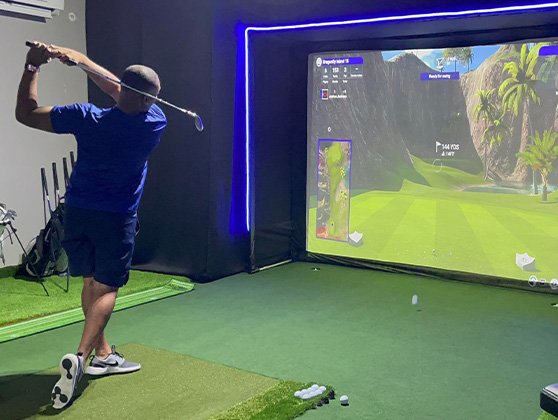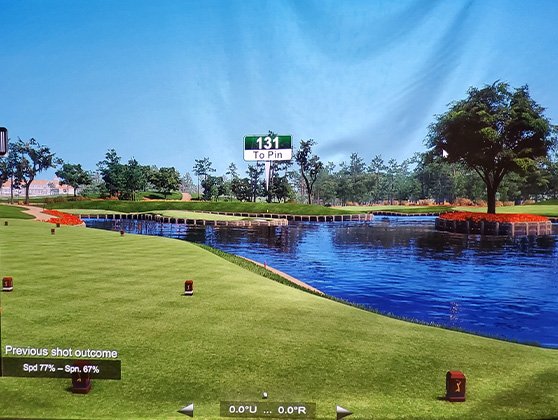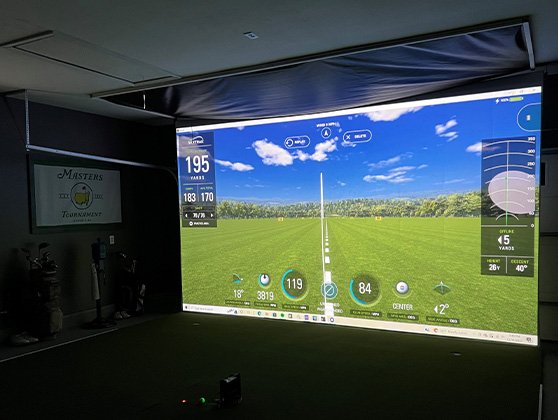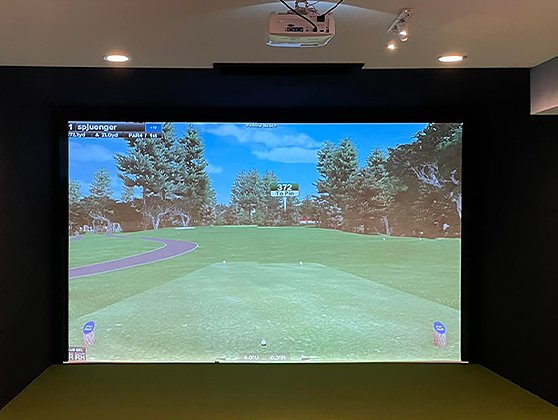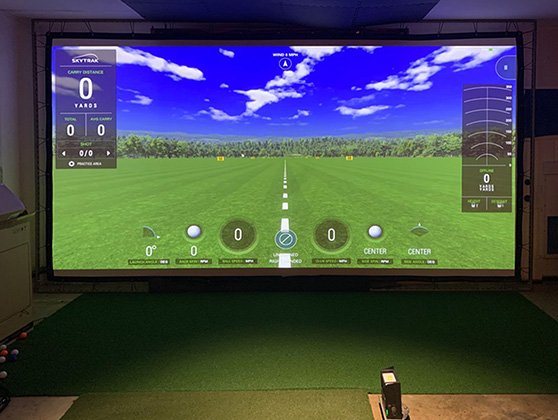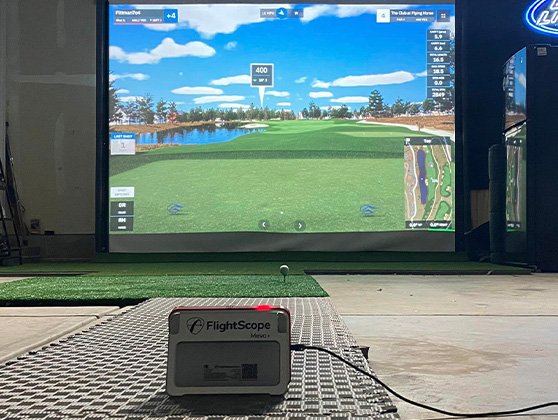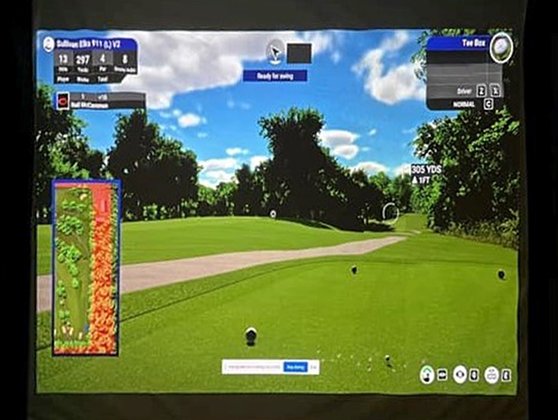A critical factor affecting your best choice of projector and where to position are dimensions, particularly the shape of your golf impact screen and the depth of your room.
Basic (Easy Setup for Smaller Spaces)
Most popular lower cost golf simulator systems such as the Optishot, SkyTrak SIG8 Studio, or SkyTrak SIG10 Studio have a square or 4:3 screen ratio, which allows you to convert a room to an indoor playing area without taking up too much space. BenQ XGA lamp-based short throw projectors are an excellent match for these, since they use the latest DLP imaging technology, deliver good colour accuracy, and don’t require cleaning or changing filters. These XGA models have a native 4:3 aspect ratio, but you can also use a 16:9 or 16:10 higher resolution projector to display in 4:3 mode.
Set up your simulator room with a 4:3 impact screen to project a 144” (7.7'x10' (screen size); 86"x115" (actual viewable size)) -193” image (10'x13' (screen size); 115"x154" (actual viewable size)) by using 3000 lumen short throw projectors with throw ratios ranging from 0.6 to 1.1, placed within 6-14 feet from the screen.
Note: Throw distance and on-screen image size vary by projector model. Please review the detailed specifications of each model prior to purchase.
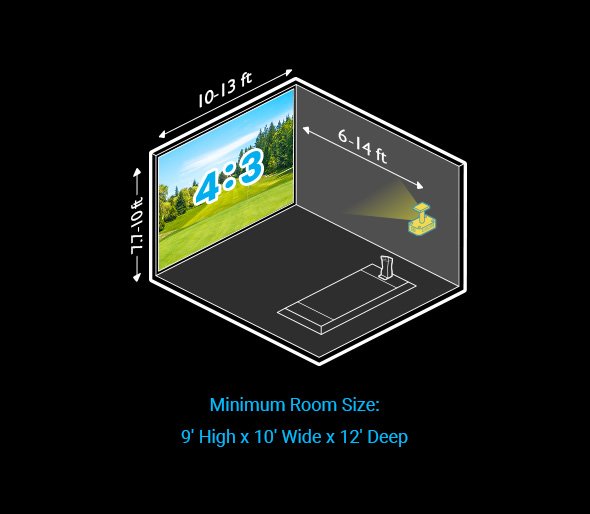
Recommended Products
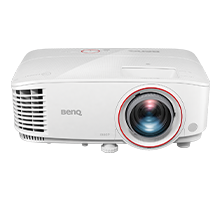
■ Perfect for DIY golf simulation setup
■ Short throw placement outside hit zone plus no shadows with 0.69~0.83 throw ratio
■ Crisp 1080p resolution
■ Tilt adjustment with vertical keystone
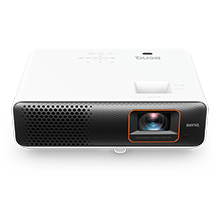
■ Perfect for lifelike golf sim and immersive gaming
■ Short throw placement outside hit zone plus no shadows with 0.69~0.83 throw ratio
■ A bright image with 2300 lumens
■ Projection alignment with 2D keystone
Advanced (16:10 Tall Image & High Brightness)
For simulators with larger impact screens, you need a projector with 4000 lumens or brighter to ensure your picture doesn’t get washed out. When using higher end golf simulators such as Uneekor and GCQuad, for the best results you should use BenQ WUXGA laser projectors with 10-bit colour processing, over 1 billion colours, and over 92% Rec 709 colour accuracy for added realism. This is better than any other high brightness projector in their class. Furthermore, BenQ WUXGA laser projectors with golf mode render more detailed grassy areas, sand traps, and sky boxes to make it feel like you are really there.
Build your simulator room with a 16:10 impact screen to project a 163” (7.7'x11.5' (screen size); 86"x139" (actual viewable size)) -218” image (10'x15.5' (screen size); 115"x185" (actual viewable size)) by using WUXGA short throw projectors with throw ratios ranging from 0.81 to 0.89, placed within 9-14 feet from the screen.
Note: Throw distance and on-screen image size vary by projector model. Please review the detailed specifications of each model prior to purchase.
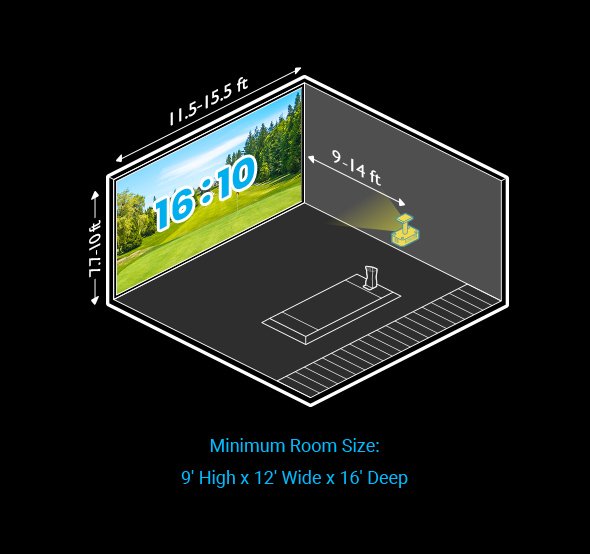
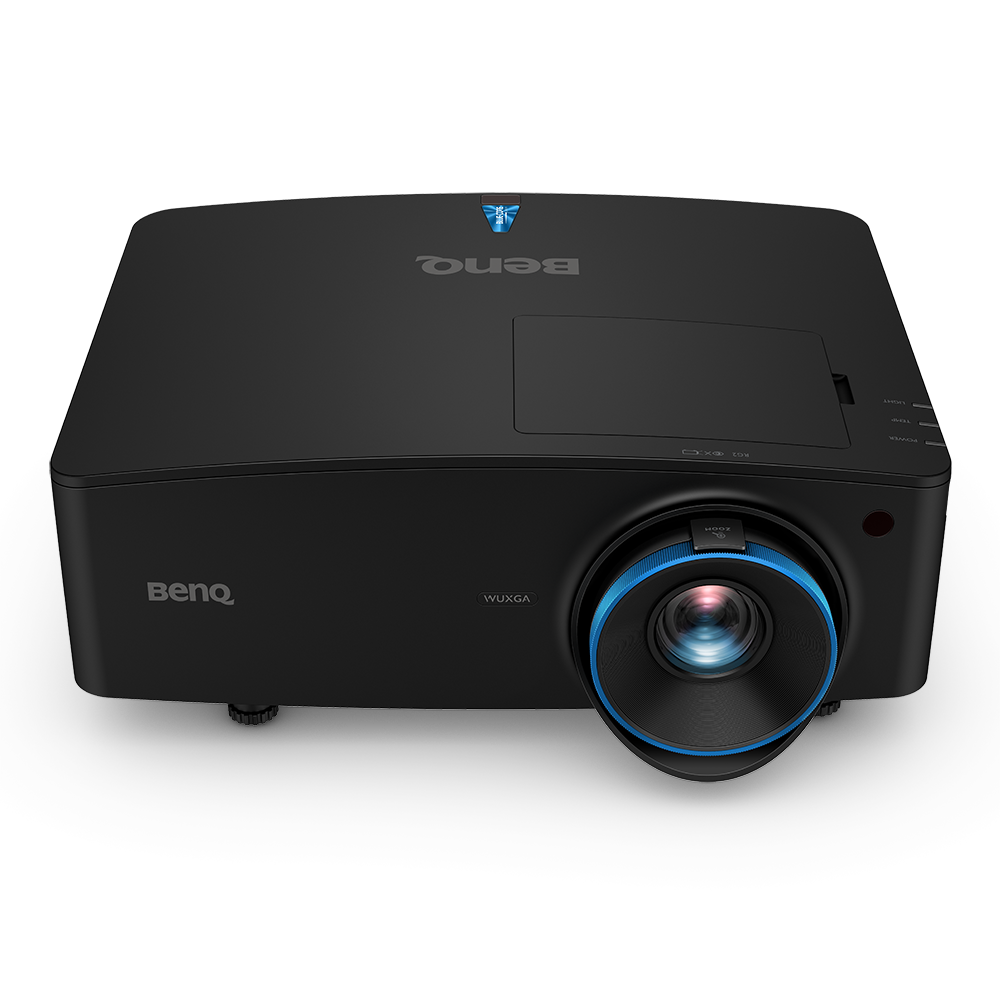
■ High brightness 5500 lumens
■ Amazing colour accuracy in golf mode
■ Short throw placement outside hit zone plus no shadows with 0.81-0.89 throw ratio
■ Off center mount made possible with lens shift
■ Projection alignment with 2D keystone and corner fit
For high-end golf simulator systems such as Foresight or TruGolf, which are optimised for use with E6 CONNECT or TGC 2019 with support for 4K output, you want a projector that make you feel like you are actually on the course. For the best widescreen experience, BenQ 4K laser short throw projectors deliver an amazing 8.3 million pixels, creating an immersive image even on impact screens wider than 18 feet. The other benefit of this setup is that it can double as a stunning home entertainment centre either for watching the Masters in 4K or streaming movies and playing video games. BenQ 4K laser projectors have the home theater features you want, such as colour accuracy and HDR, turning your golf simulator room into a multifunction entertainment area.
Choose a simulator room with a 16:9 impact screen to project a 177” (7.7'x13' (screen size); 86"x154" (actual viewable size)) -236” image (10'x18' (screen size); 115"x205" (actual viewable size)) by using 4K short throw projectors with throw ratios ranging from 0.8 to 1.2, placed within 10-19 feet from the screen.
Note: Throw distance and on-screen image size vary by projector model. Please review the detailed specifications of each model prior to purchase.
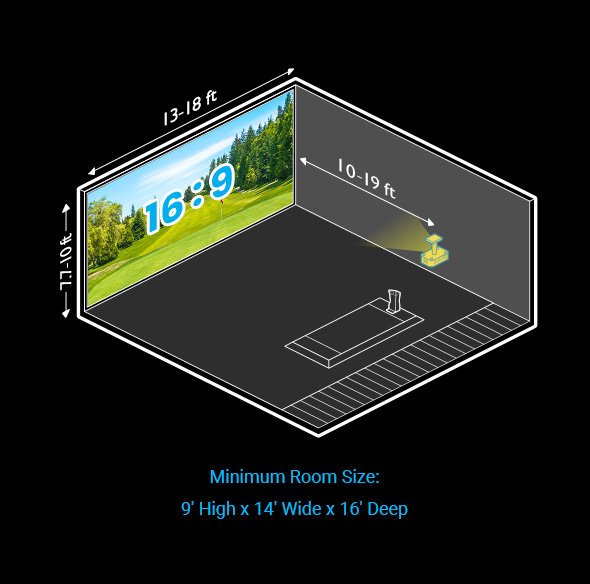
Recommended Products
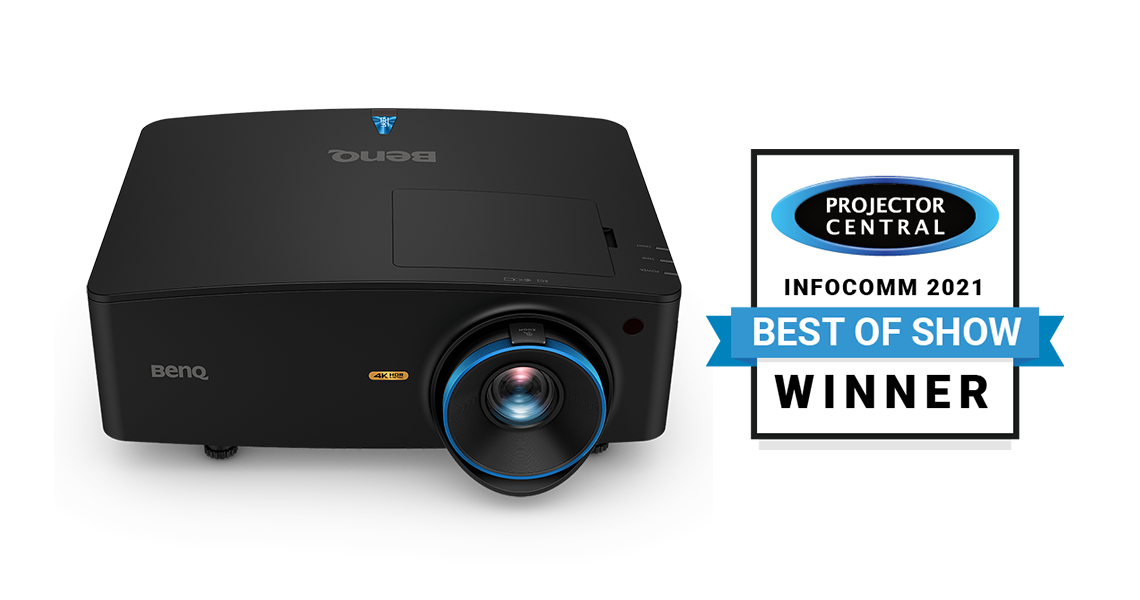
■ 4K UHD resolution with HDR enabled for lifelike golf sims and home theater
■ High brightness 5100 lumens
■ Amazing colour accuracy in golf mode
■ Short throw placement outside hit zone plus no shadows with 0.81-0.89 throw ratio
■ Off centre mount made possible with V/H lens shift
■ Projection alignment with 2D keystone, picture rotation and corner fit
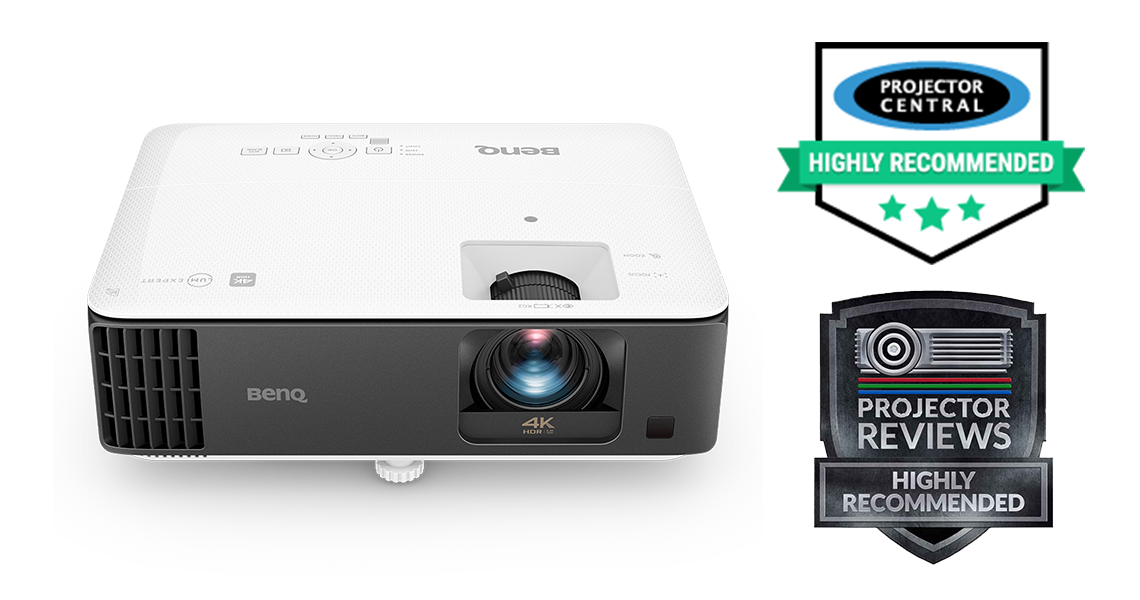
■ 4K UHD resolution with HDR enabled for lifelike golf sims and immersive home theatre
■ Short throw placement outside hit zone plus no shadows with 0.9~1.08 throw ratio
■ Projection alignment with 2D keystone and picture rotation
.
.
.
A good projector is the heart of a good home golf simulator. It projects the digital feed of the simulator software onto the impact screen so that you can see your ball fly in front of you, bringing the experience to life on-screen.
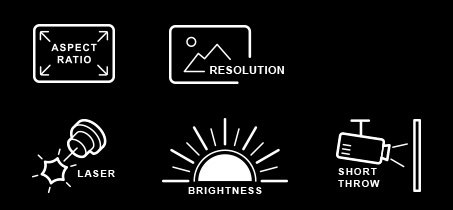
Having difficulty finding the golf simulation projector that is right for you?
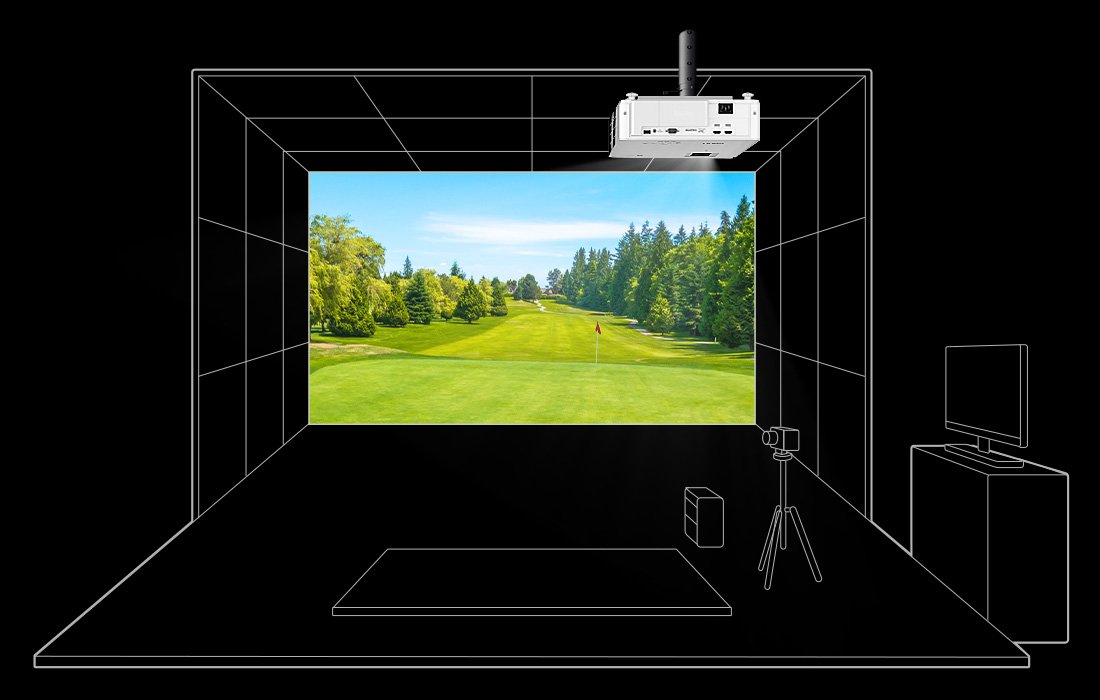
Essentials to Keep in Mind
when Choosing a Golf Simulator Projector
Aspect Ratio
The first thing to consider is the aspect ratio of the screen. For smaller setups, a 4:3 or square aspect ratio offers the most hitting zone coverage in a small area. Projectors with native 4:3 aspect ratio (XGA) have lower resolution, but you can also setup a higher resolution projector to display in a 4:3 mode. A widescreen aspect ratio is more realistic and gives you a better view of holes away from the fairway. Native 16:9 and 16:10 widescreen projectors offer higher resolution and are excellent when used as a home theater or large screen TV.

4:3 signal as projected by a 16:9/16:10 projector
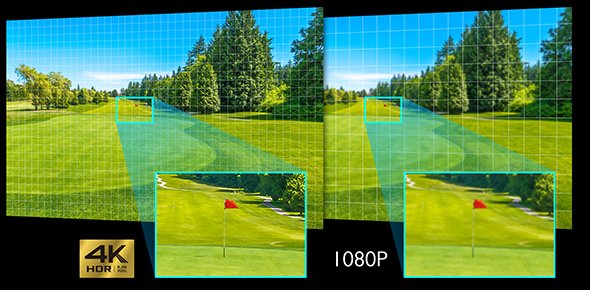
Resolution
Resolution is what enables you to see details on every tree and the subtle contours of a sand trap. The bigger your impact screen, the more important resolution becomes in creating a realistic image. Typically smaller systems will use 1080p or lower resolution, and WUXGA is used for mid-sized screens. For the best widescreen experience, a 4K projector creates an immersive image even on impact screens larger than 13 feet wide. This is especially important if you are using high-end simulators optimized for use with software such as E6 CONNECT or TGC 2019, which support 4K output.
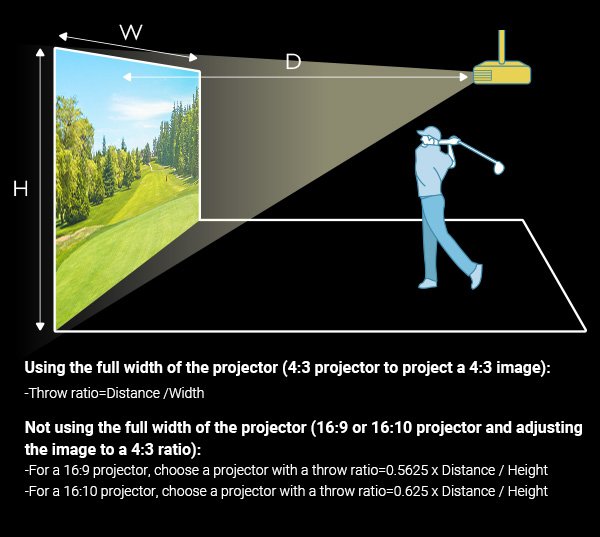
Projector Position
.The best mounting position for a projector is just behind and above the hitting area, roughly 2-3 feet behind the tee location, so the projector is away from the club path and sufficiently away from the screen to avoid being hit by a golf ball (and without casting a shadow).
.The “throw ratio” of a projector determines the distance needed for the projector to fill up your impact screen. For most home simulation setups you will want a “short throw” projector, which has a throw ratio around 1.0 or less, which helps you put the projector where it is needed to fill the screen while being safely mounted outside the hitting area, and without casting a shadow.
Note: The width of the simulator space is a limiting factor, and thus you can use a 16:9 or 16:10 projector to project a 4:3 image. In this case, you won't be using the projector's full image width, and for easier calculation we suggest you choose the right throw ratio using the modified formula to calculate distance and height. d height.
.Most projectors are mounted on ceilings, placed on the floor in front of the impact screen, or to the side of the playing area using optical image correction tools such as lens shift and keystone correction. Some projector models have “digital shrink” which is helpful when mounting the projector further back from the playing area, reducing the image size so it doesn’t exceed screen boundaries.
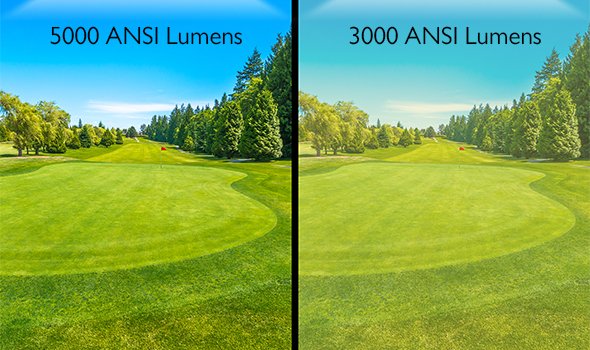
Brightness & Colour Accuracy
Golf simulation projectors need to be brighter than a home theater projector, since you need enough light in the room for your camera to see your club and track the ball spin as it travels to the impact screen. A 3000 ANSI lumen projector is a good starting point for a smaller impact screen. For larger screens that are 10 feet or wider, you will want to look for a 4000 lumen or brighter laser projector. High-end 5000 lumen laser projectors are the most popular choice with brighter rooms and a bigger screens.
Note: A native 16:9 projector that is displaying a 4:3 image only uses 75% of the screen, reducing light output by 25%. For a native 16:10 projector, a 4:3 image uses 83% of the projector’s display, reducing light output by 17%.
The other element to consider for a realistic simulator is colour accuracy. A projector with high colour accuracy properly shows the bumps in the fairway and the contour of sand traps. Many higher brightness projectors (4000 lumen or more) don’t specify colour accuracy, so look for a projector that does (typically as a percentage of Rec.709) to ensure you get a bright and realistic image.
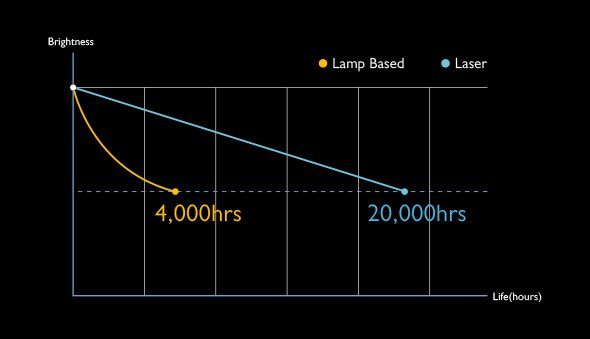
Light Sources
The light sources for the most commonly used projectors usually fall into three categories: traditional lamps, lasers, or LED. Traditional bulbs have the advantage of low purchasing costs, but they come with the major disadvantage of a short-life span. Under normal conditions a traditional lamp gives you about 4,000 to 6,000 hours of service. Furthermore, in the span of those thousands of hours, the light from the lamp tends to deteriorate, becoming both darker and more yellow. As lasers are able to produce a wider selection of wavelengths, they feature a larger colour spectrum, allowing them to re-create over 90% of colours visible to the human eye for near perfect colour representation. At the same time, lasers feature ultra-high brightness and long lifespans of roughly 20,000 hours of use, thereby drastically reducing maintenance costs.
Want to Talk to a Golf Simulator Projector Expert?
BenQ has a network of professionals to help you find the perfect golf simulation projector – within your room size and budget. To help you make the best decision, you can reach out to one of our experts to set up anything from a chat to a complete online demo, to help you find the right projector for your needs.



